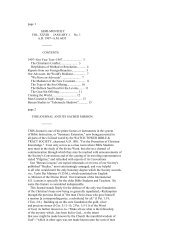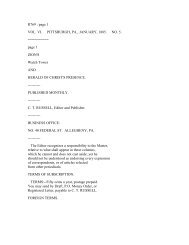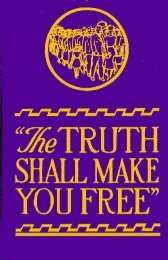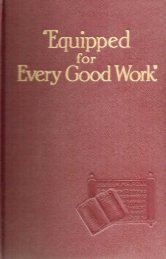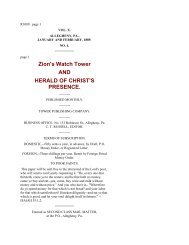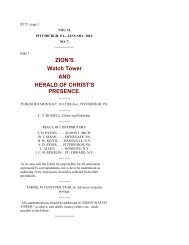- Page 1 and 2:
~~p~~ the eaith dirtre~s of nations
- Page 3 and 4:
--PASTOR RUSSELL'S ROUND-THE-WORLD
- Page 5 and 6:
PASTOR RUSSELL'S ROUND-THE-WORLD TO
- Page 10 and 11:
'' ha~lx.:t,.I-?rn R~t-qr*). xvhr-h
- Page 12 and 13:
PASTOR RUSSELL'S ROUND-THE-WORLD TO
- Page 14 and 15:
==========ALSO FRENCH, GERMAN, SWED
- Page 16 and 17:
But a man, altruistic in the highes
- Page 18 and 19:
is a warfare, and the above words o
- Page 20 and 21:
our opponents in a few words, when
- Page 22 and 23:
prosperity. Herod, the Edomite, had
- Page 24 and 25:
of Christ and His Bride to accompli
- Page 26 and 27:
During a considerable part of the t
- Page 28 and 29:
Los Angeles, Cal., was reached in d
- Page 30 and 31:
have fulfilment: "In thy Seed shall
- Page 32 and 33:
in another sense they are yet to be
- Page 34 and 35:
hands of the Lord to give them to m
- Page 36 and 37:
As they talked about His goodness,
- Page 38 and 39:
e expended as the officers of the S
- Page 40 and 41:
packages. If no designation is made
- Page 42 and 43:
families of the earth. I intend to
- Page 44 and 45:
faith, and states that some of the
- Page 46 and 47:
that I had forgotten any pins with
- Page 48 and 49:
We have here with the Lord's aid co
- Page 50 and 51:
"Don't neglect the business section
- Page 52 and 53:
and in touch with the Studies, etc.
- Page 54 and 55:
were dying and needed new life. Thi
- Page 56 and 57:
his Logos, or messenger, or word, o
- Page 58 and 59:
"Blessed and holy is he that hath p
- Page 60 and 61:
sacrifice, holy and acceptable to G
- Page 62 and 63:
the ransom-price for the sins of th
- Page 64 and 65:
horses and carriages, fruits and fl
- Page 66 and 67:
in the General Assembly of the Chur
- Page 68 and 69:
the light. "Marvel not, My brethren
- Page 70 and 71:
St. Paul calls "the deep things of
- Page 72 and 73:
eached the age of thirty and conseq
- Page 74 and 75:
JESUS' THREE TEMPTATIONSWhen the Ma
- Page 76 and 77:
--MARCH 3.--MARK 1:14-28.--Text.--"
- Page 78 and 79:
upon the Divine promise--the Divine
- Page 80 and 81:
The Lord is dead.All anguish past,
- Page 82 and 83:
count, but that he shall die for hi
- Page 84 and 85:
done so much harm that Christians o
- Page 86 and 87:
P. 364, par. 1, 2.(35) Are the ange
- Page 88 and 89:
----------Terms to the Lord's Poor
- Page 90 and 91:
our earth revolves around our sun,
- Page 92 and 93:
the trial of our first parents, bec
- Page 94 and 95:
een walking in the footsteps of Jes
- Page 96 and 97:
up in the air" to be with the Lord
- Page 98 and 99:
"Having, therefore, these promises,
- Page 100 and 101:
out of harmony with us as New Creat
- Page 102 and 103:
easonable service that we cleanse n
- Page 104 and 105:
the evil spirits spoke out, and whe
- Page 106 and 107:
faith.Already many are falling; man
- Page 108 and 109:
sympathetic. We should remember tha
- Page 110 and 111:
"Take heed to yourselves: If thy br
- Page 112 and 113:
eviled not again [in return]; when
- Page 114 and 115:
No listening still to Babel's strai
- Page 116 and 117:
of the flesh be lifted, but restitu
- Page 118 and 119:
the Law, and present the customary
- Page 120 and 121:
image and likeness of the Creator,
- Page 122 and 123:
emainYour brother in Christ,DAVID S
- Page 124 and 125:
page 73VOL. XXXIII MARCH 1 No. 5A.D
- Page 126 and 127:
THERE ARE MANY religions, and it is
- Page 128 and 129:
nothing that is logical in any of t
- Page 130 and 131:
lift up the poor from the dunghill,
- Page 132 and 133:
hearts to realize Him as the Center
- Page 134 and 135:
we have desired of the Lord, and on
- Page 136 and 137:
debtors, toward those who trespass
- Page 138 and 139:
--things necessary. The Lord's peop
- Page 140 and 141:
sore distressed. The Apostle assure
- Page 142 and 143:
himself to Brother A. more than wou
- Page 144 and 145:
matter, to see whether there is any
- Page 146 and 147:
so much self-esteem that they would
- Page 148 and 149:
Now the Church is on trial for life
- Page 150 and 151:
Pharisees as hypocritical, and told
- Page 152 and 153:
the Baptist's preaching of repentan
- Page 154 and 155:
the masses are in the darkness, and
- Page 156 and 157:
aR4988 : page 87SOME INTERESTING QU
- Page 158 and 159:
God and toward the brethren? P. 376
- Page 160 and 161:
eason of old age, or other infirmit
- Page 162 and 163:
are counted as having it; and this
- Page 164 and 165:
R4990 : page 92prophecies, mountain
- Page 166 and 167:
The world shall know the Truth that
- Page 168 and 169:
name of others; many have been guil
- Page 170 and 171:
y God's grace that we are better th
- Page 172 and 173:
they will have a very difficult tim
- Page 174 and 175:
--Rev. 21:8.R4992 : page 96========
- Page 176 and 177:
not do good to win applause for him
- Page 178 and 179:
(I Pet. 2:12.) This shows us a dist
- Page 180 and 181:
for discussion; for as no two perso
- Page 182 and 183:
R4994 : page 99JESUS' SOUL RESURREC
- Page 184 and 185:
hades, and his flesh did see corrup
- Page 186 and 187:
citing them to what David did--that
- Page 188 and 189:
we are passing through tribulation
- Page 190 and 191:
come upon you"; "Woe unto you that
- Page 192 and 193:
sacrificial merit is a sufficient p
- Page 194 and 195:
they merely presented themselves fo
- Page 196 and 197:
and in touch with the Studies, etc.
- Page 198 and 199:
at Calvary is eventually to be made
- Page 200 and 201:
shall have completed the work of re
- Page 202 and 203:
R4999 : page 109Neither is Satan on
- Page 204 and 205:
Covenant. Since the people could no
- Page 206 and 207:
why dost thou glory as if thou hads
- Page 208 and 209:
in the Scriptures to prohibit it. B
- Page 210 and 211:
danger of being a "castaway" if he
- Page 212 and 213:
In the past we may have read too ca
- Page 214 and 215:
than Jesus and the Apostles.The lat
- Page 216 and 217:
can appreciate them fully.THE PALAC
- Page 218 and 219:
of the things which he possesseth."
- Page 220 and 221:
once recognized the application and
- Page 222 and 223:
them at all, except to tell them th
- Page 224 and 225:
Example, we can show our loyalty, o
- Page 226 and 227:
ing to the world the blessed privil
- Page 228 and 229:
of Jesus on a low plane--one of the
- Page 230 and 231:
Until in Heaven Thy blessed Face I
- Page 232 and 233: And the morning..... The perfect co
- Page 234 and 235: "heathens."The proposition of a cer
- Page 236 and 237: Dispensation of Messianic glory. It
- Page 238 and 239: is made, but nearly all are charity
- Page 240 and 241: that Divine Providence had sent the
- Page 242 and 243: yet received no satisfactory reply.
- Page 244 and 245: conditions as would raise prices.Un
- Page 246 and 247: WHICH IS THE RIGHT SHIP?One mission
- Page 248 and 249: to continue such publications weekl
- Page 250 and 251: UNITED STATES TREATING FILIPINOS AS
- Page 252 and 253: CHRISTIAN INFLUENCE IN INDIAFor cen
- Page 254 and 255: Christian could possibly be. There
- Page 256 and 257: principal point at which Brother Da
- Page 258 and 259: forbid the worship of any but the o
- Page 260 and 261: obligations for the assistance in t
- Page 262 and 263: change will be for the better. The
- Page 264 and 265: wise to send another Committee to i
- Page 266 and 267: clearer knowledge of God's Word and
- Page 268 and 269: Inside back cover colored picture o
- Page 270 and 271: and in touch with the Studies, etc.
- Page 272 and 273: ...Then they also which are fallen
- Page 274 and 275: had not God specially provided, as
- Page 276 and 277: our Lord from the dead, and if a pr
- Page 278 and 279: ones, called in the Scriptures, the
- Page 280 and 281: was the angelic estate or condition
- Page 284 and 285: R5020 : page 148But the repetitions
- Page 286 and 287: corner of the earth, and be reprodu
- Page 288 and 289: of others would be perfectly proper
- Page 290 and 291: prayers would make them acceptable
- Page 292 and 293: The brethren chosen for this servic
- Page 294 and 295: Question.--What is the Apostle's th
- Page 296 and 297: her," and who are to enter into the
- Page 298 and 299: You remember the Apostle says of so
- Page 300 and 301: ====================R5024 : page 15
- Page 302 and 303: Your brother in the patient waiting
- Page 304 and 305: one of the Household of Faith, alth
- Page 306 and 307: JUNE 23(16) What would seem to be a
- Page 308 and 309: shipment, and its message, "The Han
- Page 310 and 311: statement of the matter, namely, "H
- Page 312 and 313: that the Father would arrange a Pla
- Page 314 and 315: isen from the dead when they had no
- Page 316 and 317: R5027 : page 162taught that they ha
- Page 318 and 319: saith the Lord, those who have made
- Page 320 and 321: who, already consecrated, were wait
- Page 322 and 323: law of the land should be most comp
- Page 324 and 325: and ascribed them to Isaiah, Jeremi
- Page 326 and 327: I Cor. 3:13-15.R5028 : page 165DEED
- Page 328 and 329: Kingdom class, Christ and the Churc
- Page 330 and 331: Note the expressions of the Scriptu
- Page 332 and 333:
to let down her hair in public; but
- Page 334 and 335:
a season of spiritual refreshment.
- Page 336 and 337:
more dying.----------THE FINAL TEST
- Page 338 and 339:
"shut-in" condition and other adver
- Page 340 and 341:
ut know that I fall far short of my
- Page 342 and 343:
Viewing the matter from the other s
- Page 344 and 345:
page 173VOL. XXXIII JUNE 1 No. 10A.
- Page 346 and 347:
to your order. Have a look at them
- Page 348 and 349:
"He was seen of Cephas (Peter); the
- Page 350 and 351:
into line with God's arrangements a
- Page 352 and 353:
few could endure it; and angels and
- Page 354 and 355:
should have encouraged them to get
- Page 356 and 357:
world treats them, but borne with g
- Page 358 and 359:
R5038 : page 179REPROVE WORKS OF DA
- Page 360 and 361:
the Church, the Bride class, the jo
- Page 362 and 363:
esponsible, for they would neither
- Page 364 and 365:
Scribes of this lesson had so misus
- Page 366 and 367:
the parable as follows: (1) The see
- Page 368 and 369:
all, however, lose the grand privil
- Page 370 and 371:
dear friends to understand that I h
- Page 372 and 373:
a blessing as will enable every mem
- Page 374 and 375:
----------APPLIES TO THOSE NOT SPIR
- Page 376 and 377:
Expended for supplies, etc.........
- Page 378 and 379:
Kingdom class cannot have any such
- Page 380 and 381:
JULY 14(31) What would be the effec
- Page 382 and 383:
==========ENTERED AS SECOND-CLASS M
- Page 384 and 385:
invitation is extended to all who l
- Page 386 and 387:
the sake of helping and instructing
- Page 388 and 389:
Lord's releasing of the world from
- Page 390 and 391:
Divine orders and regulations.The f
- Page 392 and 393:
Jesus is the Messiah; that He was c
- Page 394 and 395:
And my speech and my preaching were
- Page 396 and 397:
those who were under that Covenant,
- Page 398 and 399:
"Remember ye the Law of Moses My se
- Page 400 and 401:
ISRAEL'S PRESENT EXPERIENCE A PART
- Page 402 and 403:
Shall bloom and shower its fragranc
- Page 404 and 405:
and there we read, "She hath become
- Page 406 and 407:
it was necessary that they should h
- Page 408 and 409:
the "furnace" and the "fire." The i
- Page 410 and 411:
A PEARL OF GREAT VALUEIn the days o
- Page 412 and 413:
In the second case: "Answer a fool
- Page 414 and 415:
----------SIN-OFFERING AND SIN-ATON
- Page 416 and 417:
Europe were at times very interesti
- Page 418 and 419:
page 205VOL. XXXIII JULY 1 No. 13A.
- Page 420 and 421:
ing it with you. This will entitle
- Page 422 and 423:
have not been in attendance at any
- Page 424 and 425:
Thee." He used a word expressing fo
- Page 426 and 427:
Message of God's grace to those hav
- Page 428 and 429:
"I COME TO DO THY WILL""Then said H
- Page 430 and 431:
of the Holy Spirit. We read that im
- Page 432 and 433:
And the promise of the Father to Hi
- Page 434 and 435:
many ways, but only one way. "Strai
- Page 436 and 437:
R5056 : page 212to God.We have no d
- Page 438 and 439:
for the Truth, and it was satisfyin
- Page 440 and 441:
do right. Many tell us that they ha
- Page 442 and 443:
of God's promise that He will make
- Page 444 and 445:
But while all of the Lord's people
- Page 446 and 447:
e cast into the midst of the sea."
- Page 448 and 449:
JEWESS RESTORED TO LIFE--MARK 5:21-
- Page 450 and 451:
the resurrection; and it is Jesus w
- Page 452 and 453:
Pyramid to represent the Great Comp
- Page 454 and 455:
----------THE DIVINE PLAN NOT FINIS
- Page 456 and 457:
CONTENTSViews from The Watch Tower.
- Page 458 and 459:
While pointing out these things fro
- Page 460 and 461:
of the New Dispensation is nearing.
- Page 462 and 463:
have set themselves in opposition t
- Page 464 and 465:
denominations will be glad to be as
- Page 466 and 467:
Another lesson we need to learn is
- Page 468 and 469:
Then will come a company, more nume
- Page 470 and 471:
written, "Being made perfect throug
- Page 472 and 473:
when He ascended up on high; and we
- Page 474 and 475:
Jesus increased in wisdom and statu
- Page 476 and 477:
could grasp the full purport of wha
- Page 478 and 479:
am" (John 8:58), serves to identify
- Page 480 and 481:
and inherency of life.Our Lord's wo
- Page 482 and 483:
across the border, in a Gentile cit
- Page 484 and 485:
TODAY'S STUDY includes the tragedy
- Page 486 and 487:
WHEREIN IS THE DIFFERENCE?If John t
- Page 488 and 489:
afflictions of Christ."I must confe
- Page 490 and 491:
her responsibility in finding these
- Page 492 and 493:
page 237VOL. XXXIII AUGUST 1 No. 15
- Page 494 and 495:
difficulty with many Classes in the
- Page 496 and 497:
us that we cannot merit eternal lif
- Page 498 and 499:
With the Gospel Church God is deali
- Page 500 and 501:
week. Why do we observe a Sabbath?
- Page 502 and 503:
have engaged, not only to keep the
- Page 504 and 505:
Again, grace provides the Redeemer'
- Page 506 and 507:
lacking nothing. We would be inclin
- Page 508 and 509:
his faith in God although there was
- Page 510 and 511:
of the Spirit of God, in the days o
- Page 512 and 513:
their full consecration unto death.
- Page 514 and 515:
with the blood of His Son."--Acts 2
- Page 516 and 517:
work, and not plowing, harrowing, n
- Page 518 and 519:
R5075 page 248"BROUGHT DOWN TO HELL
- Page 520 and 521:
procure for them--the blessings of
- Page 522 and 523:
the glorious opportunity for salvat
- Page 524 and 525:
which came to Him in His resurrecti
- Page 526 and 527:
odies a living sacrifice, holy, acc
- Page 528 and 529:
Berean Questions in Scripture Studi
- Page 530 and 531:
mark of crystallized character is n
- Page 532 and 533:
from victory to victory. So with ou
- Page 534 and 535:
"WE HAVE THE MIND OF CHRIST"The tho
- Page 536 and 537:
these men means that so far as thei
- Page 538 and 539:
for us to aspire to the high callin
- Page 540 and 541:
filled full." (John 1511.) Those wh
- Page 542 and 543:
a day in which to judge the world i
- Page 544 and 545:
you do not wish to become a member
- Page 546 and 547:
knew what power He possessed He wou
- Page 548 and 549:
asking what method to use to get ri
- Page 550 and 551:
virtue [vitality] out of Him and he
- Page 552 and 553:
contrary to Law, cut Him off from H
- Page 554 and 555:
that the mind of Christ may dwell i
- Page 556 and 557:
The common people always referred t
- Page 558 and 559:
R5087 page 266TEACHING BY PARABLES
- Page 560 and 561:
BABES IN CHRIST AND MENAlong the sa
- Page 562 and 563:
(30) What is the immediate result o
- Page 564 and 565:
page 269VOL. XXXIII SEPTEMBER 1 No.
- Page 566 and 567:
DESCRIPTION AND PRICES.1918, price
- Page 568 and 569:
one sense of the word. As the Apost
- Page 570 and 571:
our weaknesses covered by our Lord'
- Page 572 and 573:
When mankind come to know how it wa
- Page 574 and 575:
prominence and that Jesus would be
- Page 576 and 577:
to do any service, even to the humb
- Page 578 and 579:
"They are not in trouble as other m
- Page 580 and 581:
of themselves must know that they c
- Page 582 and 583:
The cup suggests that the unfaithfu
- Page 584 and 585:
saints together unto Me; those that
- Page 586 and 587:
only ones who can do so are those w
- Page 588 and 589:
the gifts. But the fruits and grace
- Page 590 and 591:
particular as to what they say and
- Page 592 and 593:
But it is for us to show our courag
- Page 594 and 595:
wonderful courage to make the effor
- Page 596 and 597:
"For the Kingdom of God is not meat
- Page 598 and 599:
Our text is frequently misunderstoo
- Page 600 and 601:
page 285====================VOL. XX
- Page 602 and 603:
prepared. It consists mainly of pre
- Page 604 and 605:
light shall be crucially tested; a
- Page 606 and 607:
Kingdom, whatever else they may be
- Page 608 and 609:
say that a moderate use of liquor b
- Page 610 and 611:
who told us that he was a temperanc
- Page 612 and 613:
more quarrelsome in disposition, bu
- Page 614 and 615:
is dead because it has been devoted
- Page 616 and 617:
and of the Covenant of sacrifice wh
- Page 618 and 619:
extent we failed to use our knowled
- Page 620 and 621:
To be concluded in our next issue.-
- Page 622 and 623:
Message, let him present his body a
- Page 624 and 625:
complete the Elect Kingdom class, m
- Page 626 and 627:
with Him, and give us that much cle
- Page 628 and 629:
THE HOLY SCRIPTURES THE SOURCE OF T
- Page 630 and 631:
There is, however, a marked differe
- Page 632 and 633:
am the light of the world; he that
- Page 634 and 635:
DEAR PASTOR AND BROTHER BELOVED IN
- Page 636 and 637:
THE PROPER SYMBOL OF BAPTISM.(46) W
- Page 638 and 639:
page 301VOL. XXXIII OCTOBER 1 No. 1
- Page 640 and 641:
near Hughson, at 8 p.m.LONDON, ONT.
- Page 642 and 643:
whose names will be registered by t
- Page 644 and 645:
IF WE ARE naturally combative, we m
- Page 646 and 647:
twelve Apostles in the very foundat
- Page 648 and 649:
THE DECISIVE BATTLE NOW AT HANDIt i
- Page 650 and 651:
is fighting for us, and assisting a
- Page 652 and 653:
toward the service of the old taskm
- Page 654 and 655:
are not generally understood, but w
- Page 656 and 657:
God, and He spoke of them in harmon
- Page 658 and 659:
have overcome, God has said that th
- Page 660 and 661:
they had ever enjoyed. The number i
- Page 662 and 663:
The brethren, after follow-up meeti
- Page 664 and 665:
R5110 : page 312Bibles sold........
- Page 666 and 667:
in shame, in disesteem.True, they s
- Page 668 and 669:
people in Bible Study frequently; t
- Page 670 and 671:
supply should now come to pass it w
- Page 672 and 673:
power of ours. We can favor it, adv
- Page 674 and 675:
And yet I know that I shall conquer
- Page 676 and 677:
Morning Rally for Praise and Testim
- Page 678 and 679:
in self or the arm of flesh, but in
- Page 680 and 681:
us out of darkness into His marvelo
- Page 682 and 683:
willing, not only to trust God when
- Page 684 and 685:
faith tends to its development, and
- Page 686 and 687:
much the same condition as that in
- Page 688 and 689:
also in the blessing. Moses, for ex
- Page 690 and 691:
OF CHRISTThere is no question that
- Page 692 and 693:
popular errors. Such were the cause
- Page 694 and 695:
make all things work for good to th
- Page 696 and 697:
These gems must all be found by God
- Page 698 and 699:
But we think that the most serious
- Page 700 and 701:
him all that he possessed of an ear
- Page 702 and 703:
do so intelligently, and be loyal a
- Page 704 and 705:
with themselves, questioning one wi
- Page 706 and 707:
THE EDITOR'S REPLYWe think it rathe
- Page 708 and 709:
and everywhere, I am faithfully you
- Page 710 and 711:
NOVEMBER 17(25) What should be the
- Page 712 and 713:
and in touch with the Studies, etc.
- Page 714 and 715:
SLANDER A FACTOR IN ANARCHYA slande
- Page 716 and 717:
False witness applies not only to t
- Page 718 and 719:
acknowledge and to which they striv
- Page 720 and 721:
a "fruit." Possession of a gift may
- Page 722 and 723:
The whole world has a tendency to r
- Page 724 and 725:
degree of love exhibited by each on
- Page 726 and 727:
And Truth is calmness still;Truth l
- Page 728 and 729:
Adversary, they are little, if at a
- Page 730 and 731:
sight. Act quickly, therefore; the
- Page 732 and 733:
the human family, will ultimately b
- Page 734 and 735:
"for the joy that was set before Hi
- Page 736 and 737:
light of the world. This our Lord i
- Page 738 and 739:
this matter we owe it to ourselves
- Page 740 and 741:
while the Lord has given certain ex
- Page 742 and 743:
Paul declares, that the Heavenly Fa
- Page 744 and 745:
into Gehenna fire."Those who fail t
- Page 746 and 747:
DECEMBER 1(1) What are the various
- Page 748 and 749:
Consecration Normal Attitude for Go
- Page 750 and 751:
are not printed the Editor and Publ
- Page 752 and 753:
that their ideas of right and wrong
- Page 754 and 755:
y sin. In other words, upward devel
- Page 756 and 757:
School of Christ and was taught of
- Page 758 and 759:
direct influence of the Reformation
- Page 760 and 761:
such should co-operate with the ins
- Page 762 and 763:
(seventh trumpet); for the trumpet
- Page 764 and 765:
loody seas" of trial and persecutio
- Page 766 and 767:
CONSECRATION THE NORMAL ATTITUDE FO
- Page 768 and 769:
is obedient to the drawing, the nex
- Page 770 and 771:
other, even as God, for Christ's sa
- Page 772 and 773:
ethren to a strict account along li
- Page 774 and 775:
which led to sin and the sentence o
- Page 776 and 777:
more abundant" to mankind--everlast
- Page 778 and 779:
should bless all the families of th
- Page 780 and 781:
all will come short of perfection.B
- Page 782 and 783:
fail to live up to the highest stan
- Page 784 and 785:
person's belief; or by turning a pa
- Page 786 and 787:
and in touch with the STUDIES, etc.
- Page 788 and 789:
that "God shall bring every work in
- Page 790 and 791:
perfect before God, needing no furt
- Page 792 and 793:
R5139 : page 369sowing are manifest
- Page 794 and 795:
water to one of His disciples, beca
- Page 796 and 797:
IN THE TEXT, "Love not the world,"
- Page 798 and 799:
Every child of God should be on gua
- Page 800 and 801:
image.Six great Thousand-Year Perio
- Page 802 and 803:
and years. Thus the work of the Fou
- Page 804 and 805:
head or king. The Hebrew reads, lit
- Page 806 and 807:
But before beginning His work of re
- Page 808 and 809:
at home. I need not tell you that I
- Page 810 and 811:
inch in diameter. Price, $1.No. 4.
- Page 812 and 813:
But they were not so kept. In olden
- Page 814 and 815:
shall assume control of the world's
- Page 816 and 817:
SUGGESTIONS FOR BEREAN CLASSESDEAR
- Page 818 and 819:
from the Class. In such a case it m
- Page 820 and 821:
"deserted," and what are her libert
- Page 822 and 823:
----------ANNUAL SUBSCRIPTION PRICE
- Page 824 and 825:
eceived from hungry souls. Some tel
- Page 826 and 827:
even think of bursting the bonds wh
- Page 828 and 829:
Post Office rulings require us to k
- Page 830 and 831:
Number of copies "Everybody's Paper
- Page 832 and 833:
no exception to this rule. Remember
- Page 834 and 835:
The same line of attack furnishes s
- Page 836 and 837:
saints at times go too close to the
- Page 838 and 839:
Every child of God will need chaste
- Page 840 and 841:
fallen body, whose affections are c
- Page 842 and 843:
penalties. The Bible proposition is
- Page 844 and 845:
to our first parents the whole proc
- Page 846 and 847:
to their surroundings. Hence it is
- Page 848 and 849:
and Divine aid is needed. The Chris
- Page 850 and 851:
some interest. With one accord all
- Page 852 and 853:
print, and above all for the helps
- Page 854 and 855:
and open to the public.We have a go
- Page 856:
their children, and this book furni





